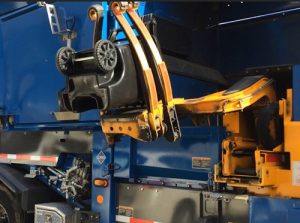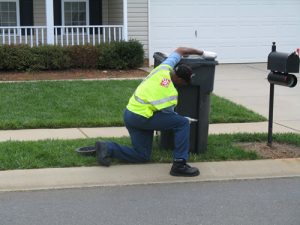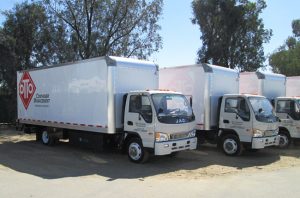By doing your research and asking some questions, you can help ensure you choose the right manufacturer to provide the best carts and containers for your small hauling business.
When it is time to choose a cart or container supplier for your waste hauling business, you don’t have to be a major national corporation to think like one. Private, local waste hauling companies have many of the same requirements as their larger counterparts—just on a smaller scale. You need:
- A reputable manufacturer with staying power
- Quality products with the right features
- A knowledgeable sales staff
- Responsive customer service representatives
- Service after the sale and container management options
- A provider who can adapt to industry changes in order to grow with your company
The carts and containers you provide your customers with are assets just like the trucks you drive, so you should ensure that you’re investing wisely.
Doing Your Research
Perhaps you’re a new company purchasing carts for the first time, or you have an established business and need to make changes to your cart inventory. Either way, choosing a manufacturer is important. A good first step in your research process is to visit company Web sites and read about each one.
- Does the company have a long, stable history? Make sure they’ve been around for an acceptable period of time. It’s a good indication that they’ll be around in the future.
- Who makes up their executive and sales teams? You want to know that the people running the business have industry experience, are experts in their fields or both.
- What is the corporate philosophy or focus? Perhaps the company focuses on sustainability. Maybe they stand on tradition—products and systems that have stood the test of time—or they are innovators and technology driven, always developing the “next best thing.” There is no right or wrong here; it’s a matter of which approach appeals to you as a business owner.
- Which associations do they belong to? You want a manufacturer that supports your industry and is active in it.
- Does the company offer a variety of products, color choices, branding opportunities and services you may want or need?
The best referrals come by word-of-mouth. If you belong to an industry association or participate in a municipal league, ask the members for recommendations or suggestions. Drive around various neighborhoods and visit businesses to see which carts and containers are already in place. You might even ask family, friends and neighbors how they like their current carts—or if they have had any quality or operational issues. Finally, if you have colleagues already in the waste or recycling industries, ask them which company they use to supply their containers and why. More importantly, ask who their sales representative is. A good sales rep can make a huge difference.
Working with a Sales Representative
As a small hauler, you should expect a cart manufacturer to treat you with the same respect and professionalism as a large national account; the same holds true for their sales representatives. A knowledgeable sales rep who offers personal attention can be a real partner in your business.
A good sales rep will know the area in which you work, whether small town, rural community or mid-size city. They will know body and truck manufacturers and understand which carts and containers work best with specific systems. Ideally, the sales rep may have existing relationships with other complementary businesses and could refer you to other resources as necessary.
A sales rep should be willing to work closely with you to provide expertise at municipal meetings or town hall discussions to help you win new contracts. This can include:
- Understanding the current and future waste hauling and recycling needs of the community
- Understanding the bid process and the specific requirements for the bid
- Helping you specify the correct cart or container for the bid that also fits in with the community
For example, a bid may specify a 95-gallon cart. If the manufacturer offers different models, you’ll want to ensure you choose the right one.
- What type of lifting equipment do your trucks have?
- Which cart design best fits the community’s needs? Is it a densely populated urban area or a sprawling subdivision with large lots?
- What is the weather like most of the time—hot, rainy, windy? You’ll want to ensure that the cart can withstand the elements, maintain its structural integrity and appearance, and operate easily.
- What color cart do you want and how should it be branded? The bid may allow little flexibility, but maybe the options are open. If the manufacturer offers many colors and various branding options —hot stamping, in-mold labeling, etc.—then the carts you choose become multiple billboards for your business. Make them stand out!
Finally, you should expect the same high level of service after the sale. A professional sales rep will be there to assist with cart deployments and any supplemental marketing materials you may need as you roll out the carts for your new contract. However, a sales rep doesn’t work alone. A strong customer service department can play a critical role in your successful cart or container rollout as well.
Customer Service Counts
When a sales team and a customer service team work together well, the customer benefits. When you are initially talking with a sales rep, ask if you’ll have a dedicated customer service representative (CSR). If your CSR has been with the company a long time, that not only speaks to company loyalty, but also to experience. Your CSR then becomes another partner in your business.
Once a sales rep has submitted a customer’s order, it is then up to the CSR to move the order as smoothly and quickly as possible through the system. There is a lot of internal collaboration when an order is placed—production, operations, logistics—and the CSR’s role is to help manage this process. The CSR and sales rep should be communicating regularly and working together to complete your order to deliver it on time. Need parts, additional containers or replacement carts? Having worked closely with you and your account, your CSR can assist with that, too.
Keeping Things Rolling
Your order is complete and delivered to your location. Now what? A container management program offered by the manufacturer may be just what you need. As a small hauler, your focus is just that—moving waste or recycling from your customers’ curbs to the landfill or recycling center. Having an additional crew or reassigning personnel to assemble, distribute and maintain your cart and container inventory might be more than you can manage.
Depending on the size of your business, you may only need an A&D rollout—an organized method of distributing carts to each customer that’s managed by a team from the manufacturer. Professional A&D crews can handle projects ranging from 500 carts to 200,000 or more. This service eliminates a huge task from your list, while deploying your carts quickly and efficiently to your customers.
You also need to maintain your cart and container inventory, so be sure to ask if your supplier offers a maintenance program and payment options for it. A maintenance program can include:
- Container logistics information
- Inventory and warranty management
- Cost-saving container repairs
- Asset rebranding
- Route auditing
Find out if the manufacturer offers barcode or RFID technology for your carts, and ask your sales rep if these are good options for you. These asset management systems not only help keep track of your carts (barcode), but also help keep your operations running smoothly with service verification reports (RFID). Bear in mind that the carts and containers you’ve purchased for your business are a big investment, and you’ll want to manage them well.
And when your cart’s lifecycle is over? Ask about container buy-back programs. Not only will you be environmentally friendly by recycling your old, damaged carts—and getting money for it—but you won’t be paying tipping costs to the landfill when you discard your carts. Since more and more consumers and communities are concerned about the environment, saying you recycle your old carts is a great marketing tool for your company.
Moving Forward
Change is inevitable, and that’s just as true in the waste and recycling industry. As you research manufacturers and speak with sales reps, ask what the future plans are for their companies. Are new products under development?
As your business grows, your sales rep can also help you wade through industry trends to help you determine how to expand and which products would be beneficial. For example, if you want to move into organics recycling, what container options does the manufacturer offer? What other resources does the manufacturer have or recommend that could be a benefit to you?
As a small hauler, you know that running your business is more than a full-time job; it’s a commitment. Ideally, the manufacturer you choose should be a one-stop shop with the professional personnel, quality products and value-added services strongly in place to make it easier for you to operate successfully. | WA
For more information, visit www.otto-usa.com.


![choosingcart-4[2]](https://wasteadvantagemag.com/wp-content/uploads/2016/01/choosingcart-42-300x137.jpg)


